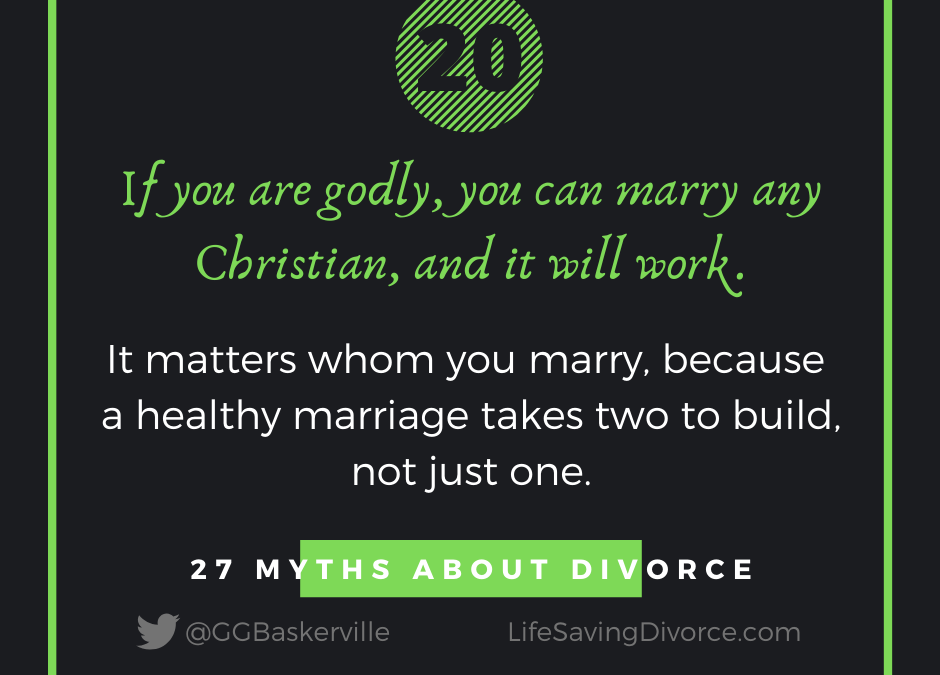
MYTH: If you are godly, you can marry any Christian, and it will work.
TRUTH: It matters whom you marry, because a healthy marriage takes two to build, not just one.
This false teaching is often foisted on both young men and women. For guys, it’s another prosperity gospel formula: If you are a godly spiritual leader, you can marry any Christian woman, regardless of her personality and character, and your life together will be happy. Put her on a pedestal, and everything will be smooth sailing. What could go wrong?
The truth is that character matters, and cultivating a healthy marriage takes two people’s efforts, not just one. In my interviews, I find loving, godly men and women who marry selfish, manipulative people; one spouse’s godliness doesn’t magically make the marriage work.
Marriage Vows Are about the Basics
Naturally, married life comes with challenges. Often, marriage requires more faithfulness, commitment, and mutual loyalty than our newlywed selves knew to expect. The Apostle Paul reminds singles that marriage comes with new priorities, such as pleasing your spouse —
I would like you to be free from concern.
An unmarried man is concerned about the Lord’s affair—how he can please the Lord. But a married man is concerned about the affairs of this world—how he can please his wife—and his interests are divided…
—1 Corinthians 7:32-34 (NIV)
As people mature, some do become better spouses who meet the basic responsibilities of the household and marriage:
- They earn money for food and clothing, and they keep a roof over their heads. They pay the bills.
- They do the dishes, laundry, cooking, child raising, car repair, grocery shopping, and clothing purchases.
- They are loyal and supportive of each other in tough times.
- They are faithful sexually, and they generally treat each other as they would want to be treated. They view sex and physical affection as important to the marriage.
We are talking basics. We’re talking minimum requirements of food, clothing, housing, affection, loyalty, and everyday assistance.
It is not about keeping up with your friends and neighbors. It isn’t about the type of house or car you have, or your career success. This is not about getting rich, finding your soulmate, healing all your emotional wounds, or winning the “wife of the year” or the “husband of the year” award.
It’s just the basics.
But some people either cannot or will not keep their vows.
- They break those promises over and over.
- They resist the responsibility.
- They misuse the family’s resources: time, money, and energy.
People who can’t manage the basics are not safe to marry.
Rather than treating their spouse fairly, they treat them like the enemy or in some cases, like they are entitled to get whatever they can. They aren’t faithful or supportive. They don't meet, or even refuse to meet, the basic needs of their spouse for food, clothing, and affection. They show disrespect and disdain, and they do violence. Their selfish desires trump their marriage vows. Sometimes it's deliberate, but sometimes it's due to their own trauma, addictions, or emotional problems.
A marriage is a partnership, and like any partnership, betrayal can destroy it, it doesn't matter whether it is deliberate or not. A person who does not or cannot hold up their end is making the marriage one-sided.
Picture marriage as a two-person canoe—it cannot get where it’s meant to go unless both people are paddling. If one person paddles while the other one drags the anchor, or only one person is making loving, cooperative efforts, while the other is cheating, abusing, lying, using drugs, or behaving dangerously, the marriage cannot work.
Popular posts:What's a Life-Saving Divorce? Where can I find the book?
One Woman's Story: Adultery, Prayer, and the Bible
27 Myths of Divorce that Aren't True for Committed Christians
The Bible Doesn't Say "God hates Divorce"—it's not in the Hebrew text
Bible verses that condone divorce for serious reasons.
"He Never Hit Me": Interview with a woman whose husband emotionally abused and neglected her
10 Turning Points: What is the "Last Straw" for Most Devout Christians. See One, Two, Three.
Children and Divorce: Why life-saving divorce is very good for children

For more on the myths of divorce, buy the Life-Saving Divorce.
As an Amazon Associate I earn from qualifying purchases.

